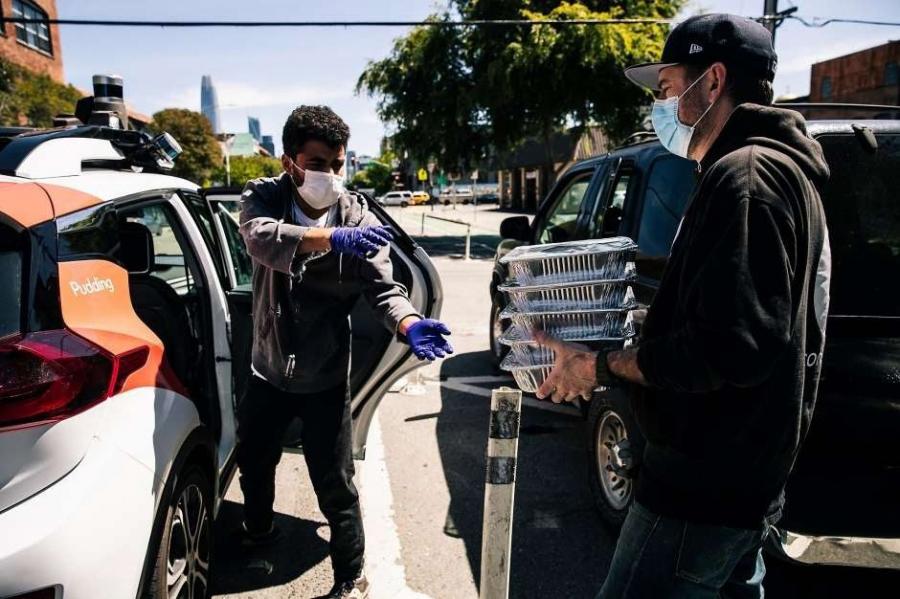The Challenge

As many of us know from the pictures of food pantry lines that wrapped around blocks early on in the pandemic, food insecurity rose rapidly over the past year. In the face of that need, amongst many other rising basic needs, the business community reconsidered many of its long-held beliefs on community impact and saw the crisis as a way to shape new approaches to social change.
At the start of the pandemic, widespread job losses created a national surge in food insecurity, now affecting 1 in 8 people in the United States according to Feeding America. Like the people they serve, food banks and pantries have been in a state of emergency for over a year. Californians for All, an initiative launched in the beginning of the pandemic to offset sharp drops in volunteers, focuses primarily on supporting food banks amidst massive increases in demand. “Right as the pandemic hit, we saw this immediate decrease in volunteers at food banks by in some cases up to 75%,” said Californians for All Director Dave Smith in an episode of Common Impact’s Pro Bono Perspectives podcast. And as we shared in our COVID-19 Nonprofit Impact Report, “increased individual donations and government funding have been outpaced by increases in costs, supply chain challenges, delivery logistics, and increased staff investments to replace volunteers.”
Food banks expect these challenges to continue after the pandemic is under control. Based on past economic crises, they – alongside other basic needs organizations – are anticipating a lasting increase in demand as unemployment benefits, stimulus checks, and other temporary stopgaps are reduced.
The Opportunity
The immediate and long-term impacts on basic needs organizations sparked many companies to rethink and redesign their approaches to community impact. Over the course of 2020, we saw businesses push aside traditional models of corporate social responsibility to more quickly and effectively meet the pressing needs of their communities. Companies loosened grant restrictions, relied more heavily on community experts to drive their giving, and pivoted their models of volunteerism in a moment when safe in-person volunteering became harder to access, but the desire to support communities was at an all-time high.
Cruise for Good
One company that heeded this call is Cruise, a San Francisco-based autonomous vehicle (AV) startup bringing together its innovative technology with its commitment to social impact to help address food insecurity in San Francisco. At the onset of the pandemic, Cruise recognized the immense pressure food banks were under and offered its resources to lessen the load. Leveraging its all-electric AV fleet and volunteer safety drivers, Cruise helped transport groceries and meals from The San Francisco Marin Food Bank and the SF New Deal to the homes of residents experiencing food insecurity. To date, Cruise for Good has delivered over one million meals to food insecure households in San Francisco.
While the Cruise for Good model was borne as an immediate response to the pandemic, Cruise is planning to continue this commitment long term. “At Cruise, we feel a responsibility to actively support the community from the start and build social impact into our everyday operations,” said Amanda Lenaghan, Head of Social Impact & Community Engagement. “We’re not waiting to hit some marker of growth first when we know we can make a difference right now. We have the opportunity to shape our industry in a way that benefits society – and it is core to our mission to serve our communities right from the start.”
“Even before the pandemic, one in five people in San Francisco and Marin were at risk of hunger,” said Michael Wirkkala, COO of the San Francisco-Marin Food Bank. “The pandemic exacerbated this crisis by forcing thousands more to make difficult choices between rent, medical bills, food, and other expenses. In particular, we saw the need for home-delivered groceries balloon as seniors stayed home to protect their health. Cruise’s collaboration and partnership was invaluable in making it possible for us to quickly scale up and ensure low-income seniors in our community didn’t have to risk their health to access fresh groceries.”
What comes next?

As we continue to face the COVID-19 crisis and the long-term challenges it has created, emerging businesses have an opportunity to step up to meet those needs. Startups and small, growing businesses often have greater visibility into community needs, as well as the innovation and design capabilities that we all need right now to reimagine solutions and impact models and, ultimately, to drive equity. Through pro bono, we’ve seen innovation and design skills translate into transformative change for community organizations and the populations they serve. By being willing to move quickly, by listening to and responding to direct community needs, and by applying innovation and design thinking to tested models, even small companies and emerging industries can build meaningful social impact into their business models from the beginning.


